12 start with E start with E
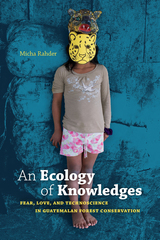

For decades, Central America has faced market dependency, natural disasters, and political systems characterized by protectionist policies and low participation--situations that have had a tremendous impact on its economic development.
This two-volume set is a comprehensive assessment of Central America's position in the world economy, and it serves as a handbook for the important economic reforms Central America must undertake to become a viable competitor in the international economy.

For decades, Central America has faced market dependency, natural disasters, and political systems characterized by protectionist policies and low participation--situations that have had a tremendous impact on its economic development.
This two-volume set is a comprehensive assessment of Central America's position in the world economy, and it serves as a handbook for the important economic reforms Central America must undertake to become a viable competitor in the international economy.
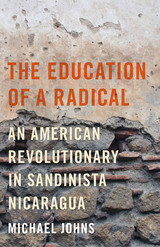
“I went to Nicaragua with nothing but a tourist visa, $1,500 in cash, the name of someone at the Agrarian Reform Ministry, and the idea of being a revolutionary intellectual. . . . The idea took hold in a simple character flaw: wanting to believe that I knew better than everyone else.” —From the preface
When Michael Johns joined a Sandinista militia in 1983, a fellow revolutionary dubbed him a rábano, a radish: red on the outside but white on the inside. Now, more than twenty-five years later, Johns appreciates the wisdom of that label as he revisits the questions of identity he tried to resolve by working with the Sandinistas at that point in his life. In The Education of a Radical, Johns recounts his immersion in Marxism and the Nicaraguan sojourn it led to, with a painful maturation process along the way.
His conversion began in college, where he joined a student group called the Latin American Solidarity Association and traveled to Chiapas, Mexico, for research on his senior thesis. Overwhelmed by the poverty he witnessed (and fascinated by a new friend named Maricela who was trying to turn peasants into revolutionaries and who carried a heavily highlighted copy of Late Capitalism), he experienced an ideological transformation. When a Marxist professor later encouraged him to travel to Nicaragua, the real internal battle began for him, a battle that was intensified by the U.S. invasion of Grenada and its effect on the Sandinistas, who believed they were the next target for an imminent American invasion. Before he knew it, Johns was digging trenches and learning how to use an AK-47. His intellectual ideals came face-to-face with revolutionary facts, and the results would perplex him for years to come.
Bringing to life a vivid portrait of the sometimes painful process of reconciling reality with romanticized principles, The Education of a Radical encapsulates a trove of truths about humanity, economics, and politics in one man’s memorable journey.
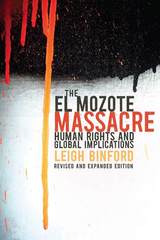
Almost two decades later, the consequences of the massacre continue to reverberate through the country’s legal and socioeconomic systems. The El Mozote Massacre, 2nd Edition brings together new evidence to address reconstruction, historical memory, and human rights issues resulting from what may be the largest massacre in modern Latin American history.
With a multitude of additions, including three new chapters, an extended chronology, discussion of the hearing and ruling of the Inter-American Court of Human Rights in 2012, and evidence gathered throughout half a dozen field trips made by the author, Binford presents a current perspective on the effects of this tragic moment in history. Thanks to geographically expanded fieldwork, Binford offers critical discussion of postwar social, economic, religious, and social justice in El Mozote, and adds important new regional, national, and global contexts.
The El Mozote Massacre, 2nd Edition maintains the crucial presence of the massacre in human rights discussions for El Salvador, Latin America, and the world.
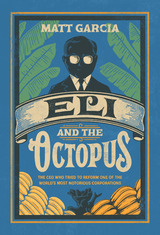
The poignant rise and fall of an idealistic immigrant who, as CEO of a major conglomerate, tried to change the way America did business before he himself was swallowed up by corporate corruption.
At 8 a.m. on February 3, 1975, Eli Black leapt to his death from the 44th floor of Manhattan’s Pan Am building. The immigrant-turned-CEO of United Brands—formerly United Fruit, now Chiquita—Black seemed an embodiment of the American dream. United Brands was transformed under his leadership—from the “octopus,” a nickname that captured the corrupt power the company had held over Latin American governments, to “the most socially conscious company in the hemisphere,” according to a well-placed commentator. How did it all go wrong?
Eli and the Octopus traces the rise and fall of an enigmatic business leader and his influence on the nascent project of corporate social responsibility. Born Menashe Elihu Blachowitz in Lublin, Poland, Black arrived in New York at the age of three and became a rabbi before entering the business world. Driven by the moral tenets of his faith, he charted a new course in industries known for poor treatment of workers, partnering with labor leaders like Cesar Chavez to improve conditions. But risky investments, economic recession, and a costly wave of natural disasters led Black away from the path of reform and toward corrupt backroom dealing.
Now, two decades after Google’s embrace of “Don’t be evil” as its unofficial motto, debates about “ethical capitalism” are more heated than ever. Matt Garcia presents an unvarnished portrait of Black’s complicated legacy. Exploring the limits of corporate social responsibility on American life, Eli and the Octopus offers pointed lessons for those who hope to do good while doing business.
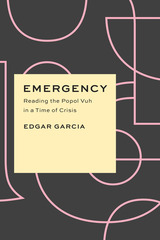
Written during the lockdown in Chicago in the depths of the COVID-19 pandemic, these essays consider the Popol Vuh as a work that was also written during a time of feverish social, political, and epidemiological crisis as Spanish missionaries and colonial military deepened their conquest of indigenous peoples and cultures in Mesoamerica. What separates the Popol Vuh from many other creation texts is the disposition of the gods engaged in creation. Whereas the book of Genesis is declarative in telling the story of the world’s creation, the Popol Vuh is interrogative and analytical: the gods, for example, question whether people actually need to be created, given the many perfect animals they have already placed on earth.
Emergency uses the historical emergency of the Popol Vuh to frame the ongoing emergencies of colonialism that have surfaced all too clearly in the global health crisis of COVID-19. In doing so, these essays reveal how the authors of the Popol Vuh—while implicated in deep social crisis—nonetheless insisted on transforming emergency into scenes of social, political, and intellectual emergence, translating crisis into creativity and world creation.
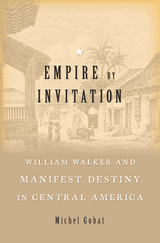
Michel Gobat traces the untold story of the rise and fall of the first U.S. overseas empire to William Walker, a believer in the nation’s manifest destiny to spread its blessings not only westward but abroad as well.
In the 1850s Walker and a small group of U.S. expansionists migrated to Nicaragua determined to forge a tropical “empire of liberty.” His quest to free Central American masses from allegedly despotic elites initially enjoyed strong local support from liberal Nicaraguans who hoped U.S.-style democracy and progress would spread across the land. As Walker’s group of “filibusters” proceeded to help Nicaraguans battle the ruling conservatives, their seizure of power electrified the U.S. public and attracted some 12,000 colonists, including moral reformers. But what began with promises of liberation devolved into a reign of terror. After two years, Walker was driven out.
Nicaraguans’ initial embrace of Walker complicates assumptions about U.S. imperialism. Empire by Invitation refuses to place Walker among American slaveholders who sought to extend human bondage southward. Instead, Walker and his followers, most of whom were Northerners, must be understood as liberals and democracy promoters. Their ambition was to establish a democratic state by force. Much like their successors in liberal-internationalist and neoconservative foreign policy circles a century later in Washington, D.C., Walker and his fellow imperialists inspired a global anti-U.S. backlash. Fear of a “northern colossus” precipitated a hemispheric alliance against the United States and gave birth to the idea of Latin America.


The Central American region is a vital ecological resource that provides environmental balance for the rest of the American continents. Using comprehensive surveys and statistical studies, this volume presents an evaluation of the region's deforestation, sustainable agriculture, tourism, emerging carbon markets, trade, and growth.
By comparing and contrasting policies applied by other countries with similar environmental characteristics, the contributors argue that Central American governments must learn from the results of these policies in order to manage resources, foster sustainability and competitiveness, and procure positive results.
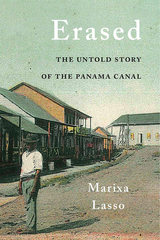
The Panama Canal's untold history—from the Panamanian point of view. Sleuth and scholar Marixa Lasso recounts how the canal’s American builders displaced 40,000 residents and erased entire towns in the guise of bringing modernity to the tropics.
The Panama Canal set a new course for the modern development of Central America. Cutting a convenient path from the Atlantic to the Pacific oceans, it hastened the currents of trade and migration that were already reshaping the Western hemisphere. Yet the waterway was built at considerable cost to a way of life that had characterized the region for centuries. In Erased, Marixa Lasso recovers the history of the Panamanian cities and towns that once formed the backbone of the republic.
Drawing on vast and previously untapped archival sources and personal recollections, Lasso describes the canal’s displacement of peasants, homeowners, and shop owners, and chronicles the destruction of a centuries-old commercial culture and environment. On completion of the canal, the United States engineered a tropical idyll to replace the lost cities and towns—a space miraculously cleansed of poverty, unemployment, and people—which served as a convenient backdrop to the manicured suburbs built exclusively for Americans. By restoring the sounds, sights, and stories of a world wiped clean by U.S. commerce and political ambition, Lasso compellingly pushes back against a triumphalist narrative that erases the contribution of Latin America to its own history.
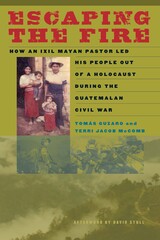
During the height of the Guatemalan civil war, Tomás Guzaro, a Mayan evangelical pastor, led more than two hundred fellow Mayas out of guerrilla-controlled Ixil territory and into the relative safety of the government army's hands. This exodus was one of the factors that caused the guerrillas to lose their grip on the Ixil, thus hastening the return of peace to the area.
In Escaping the Fire, Guzaro relates the hardships common to most Mayas and the resulting unrest that opened the door to civil war. He details the Guatemalan army's atrocities while also describing the Guerrilla Army of the Poor's rise to power in Ixil country, which resulted in limited religious freedom, murdered church leaders, and threatened congregations. His story climaxes with the harrowing vision that induced him to guide his people out of their war-torn homeland.
Guzaro also provides an intimate look at his spiritual pilgrimage through all three of Guatemala's main religions. The son of a Mayan priest, formerly a leader in the Catholic Church, and finally a convert to Protestantism, Guzaro, in detailing his religious life, offers insight into the widespread shift toward Protestantism in Latin America over the past four decades.
Riveting and highly personal, Escaping the Fire ultimately provides a counterpoint to the usual interpretation of indigenous agency during the Guatemalan civil war by documenting the little-studied experiences of Protestants living in guerrilla-held territory.
READERS
Browse our collection.
PUBLISHERS
See BiblioVault's publisher services.
STUDENT SERVICES
Files for college accessibility offices.
UChicago Accessibility Resources
home | accessibility | search | about | contact us
BiblioVault ® 2001 - 2024
The University of Chicago Press









